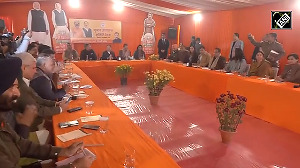Neerja Chowdhury says that dynastic politics is the bane of our democracy.
This story surfaced when Shankar Dayal Sharma was the President and P V Narasimha Rao was prime minister, both veterans of realpolitik and adept at the art of 'politicalese', saying things and yet not saying them.
It was said that the then President had it conveyed to the then PM that he hoped for a Rajya Sabha nomination for his son. Rao sent minister of state in the Prime Minister's Office, Bhuvnesh Chaturvedi to meet the President and sense his mood. Chaturvedi too no spring chick and let sentences like this one drop during conversation, "Of course we have to think of a second term for you (as President)".
As Chaturvedi was coming out of Rashtrapati Bhavan, a messenger came running after him saying that the President's wife wanted to see him. He turned back and was taken to another room, where Vimla Sharma anxiously awaited him. She gave him an envelope which contained the bio-data of her son who sought the Rajya Sabha nomination. The President himself had made no mention of the matter.
Narasimha Rao, a master at deflecting pressure, neither gave a Rajya Sabha ticket to the President's son, nor a second term to the Rashtrapati.
But then since the early nineties, a lot of water has flown down the Yamuna..
Giving a ticket to President Pratibha Patil's son to contest on a Congress ticket in the October assembly elections in Maharashtra has implications which go beyond yet another political offspring getting an out of turn opportunity because of his surname.
Few would believe that Rajendra Shekhawat could manage to beat the other Congress claimant to the ticket, a minister in the outgoing state government, who had won successive elections, without pressure from Rashtrapati Bhavan.
And even if the President did not have anything to do with her son being nominated , still, Caesar's wife is expected to be above suspicion in a democratic setup. One can understand a mother's desire to ensure that her son gets the best opportunities and is well settled in life. But here we are not just talking about a mother; we are talking about the President of India, who represents the entire nation and is not supposed to be close to any party.
Therefore this particular case cannot be compared to Union ministers getting tickets for their children, Vilasrao Deshmukh for his son and Sushil Kumar Shinde for his daughter, or for that matter a host of others.
This is not to say that past Presidents did not use their positions to push for advantages for their children or that Rashtrapati Bhavan was above controversy in the past.
But this instance goes beyond the general issue of the legitimisation of political dynasties. The politicisation of the presidency is bound to impact the health and the non-partisan character of Rashtrapatri Bhavan as was envisaged by our constitutional forefathers.
Giving tickets to children of established politicians is a phenomenon which has been growing by leaps and bounds. This time the numbers dynastic nominations for the Maharashtra and Haryana polls are even larger. More important, they were sought even more openly and unashamedly than in the past, and this is the worrying part of it, as if it was their birthright to do so. Gone are all the fig leaves.
Monarchies ensured the enthronement of the son after the death of the ruler as a matter of right. But this is the upshot of what Jagan Mohan Reddy, son of the late YS Rajasekhara Reddy is saying today. His claim to chief ministership in place of his father, after YSR's tragic death in an air crash, is based on the premise, as he himself put it recently at a public meeting, that people see his father in him. And therefore he, even though he is a political novice, should takeover as CM.
The rise of political dynasties is also linked inextricably to the growth of money power in Indian politics. The cry from different quarters in Andhra Pradesh today to install Jagan is only partly due to sympathy because of the tragic and sudden manner in which YSR died, but it is also emanating from the vast network of wealth, power and patronage YSR had created. Such is the magnitude of this inheritance, with its grip over the politico-economic-bureaucratic setup, that all stakeholders would like a family member to take over so that this superstructure can continue undisturbed so that they continue to benefit from it.
A large number of the youngsters coming into politics today belong to political families. There are two broad categories of political dynasties. There are the relatives who are offered a ticket after their father/mother/relative dies. But after that initial entry into the system, they have to fend for themselves, and fight their way up like others.
Then there are others whose fathers or mothers want to establish their children politically in their lifetime, while the parent remains in power or is powerful politically.
Many argue that if a lawyer's son can be a lawyer, a doctor's son a doctor, a film star's son an actor, why cannot a politician's son be a politician? Desirable though democracy would be in all these professions, there is a difference.
A doctor, lawyer, musician, who promotes his child, does not claim to run a democratically elected organisation. Political parties in India on the other hand are supposed to be democratic entitities, even though most parties have become family concerns today. Even the BJP, which had at one time made opposition to the dynastic rule one of its of cardinal principles, is afflicted by the malaise though for the moment it is happening more at the state level -- with the likes of Prem Kumar Dhumal, Shivraj Singh Chouhan, B S Yeddyurappa, Gopinath Munde.
Should, then, children of political families, who have the advantage of 'watching and absorbing' politics from the time they are in their cradles and diapers, be kept out, in what could become reverse injustice?
Possibly not. But, there has to be system of checks and balances put in place. First, they, even more than others, must show recognised work done in the party for some years before seeking entry into a legislature. There is need for a clearly-defined criteria for ticket distribution, and its transparent enforcement. And secondly, given the extent of our feudal mindset and way of functioning, the number of those coming from established politics families should not exceed a certain percentage, and this should be adhered to strictly.
In 2004, when Lalu Yadav had gone to Pakistan, people would stop him in the marketplace and ask him if it was really true that he belonged to a family of `gwalas' who had risen from the ranks to become the chief minister of Bihar.
If we do not check the dynastic trend, Lalu Yadavs will become a thing of the past, even as we may continue to have the Rabri Devis. And the Great Indian Democracy will get limited to 500 families.
Neerja Chowdhury is a senior New Delhi-based journalist






 © 2025 Rediff.com -
© 2025 Rediff.com -